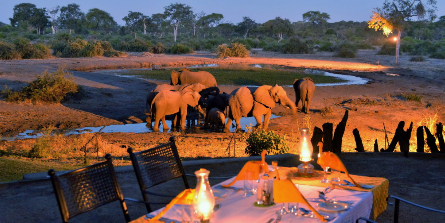Life in the fast lane takes its toll, and more travellers are wanting to not only get off the grid, but completely off the map when on vacation. But delivering luxury in the middle of nowhere is by no means an easy feat. Liesl Venter spoke to some tourism experts to find out what is entailed in providing luxury in remote locations.
As the world becomes more complex, over populated and polluted, there is an instinctive yearning for more ‘meaningful’ travel.
“Our advantage in Africa is that we are able to connect travellers with nature and present them with unique experiences that they can’t have anywhere else in the world,” says Janie van der Spuy, luxury travel and hospitality expert and Head of FiveStar PR.
“Herein lies the opportunity for the local travel industry – to explore remote locations and make wild and precious destinations accessible to this exclusive market of sophisticated travellers, without their having to compromise on the luxury they are accustomed to.”
Not compromising on luxury, however, isn’t easy, considering where some of these properties are located.
“Most properties take their location into consideration long before they even open the doors,” says Anita Streich, Managing Director of African Travel Concept luxury division, Elite Travel Concept.
“Also luxury is evolving. Where in the past luxury meant luxury goods, staying in the best hotels, seeing and being seen by everyone, it now means experiences that are not run-of-the-mill. Experience versus material offerings.”
This does not mean that these establishments don’t have all the bells and whistles, but it does mean, because of their remoteness, they are able to offer experiences that would not easily be replicated in the rest of a client’s journey.
“That is what people are after more than anything else,” says Streich.
According to Chris Anagnostellis, Chief Operations Officer of An African Anthology, says delivering this very experience nowadays, does have some benefit in delivering luxury.
“One will find that guests getting that luxury experience are far more forgiving in a remote location if they are not getting the luxury goods expected, than they would be if they were in a city five-star establishment, for example.”

African Anthology’s Elephant Valley Lodge is surrounded by the peaceful wilderness of the African bush.
This is because, while luxury will always be synonymous with the finer things in life, it has become an interpretation for many.
“If the experience being sought is isolation and remoteness, for example, then luxury could easily be interpreted as being in a tented camp in the middle of the Okavango where the guest can see the stars at night and watch animals close by in the day. It would not necessarily then matter if it was just a standard tent, because the luxury would be found in the richness of the experience,” explains Anagnostellis.
Having said that, he admits that there are very few luxury establishments that don’t deliver pretty extraordinary service and facilities in areas where there is just about nothing else.
“It requires huge organisational skill and exceptional logistics,” he says. “Of course the more remote the location, the more difficult to deliver luxury.”
It also requires building infrastructure with the end goal in mind while at the same time developing good working relationships with the local authorities and communities, says Van der Spuy. “Another important element to the success of a remote luxury location is having an excellent management team on the ground and investing in continuous training and upskilling of service staff.”
Nicky Coenen, General Manager of The Last Word Intimate Hotels, says people are prepared to pay for exclusivity.
“Just as one can fly a guest in, so too you can fly in the décor and personnel to create the luxury.”
Says Anagnostellis: “To deliver luxury in any remote area, one has to be practical and remember there is no corner shop that you can just pop in to. There have to be back-up plans for emergencies and you have to plan every last deliverable in detail.”
He says often when it comes to food it is important to source some of the produce locally and to use local people for the washing of bedding and linen, for example.
“Not any one remote location is the same and it is more challenging to deliver luxury in these areas than in cities, but if one is creative and innovative just about anything is possible.”
At a price, that is.























